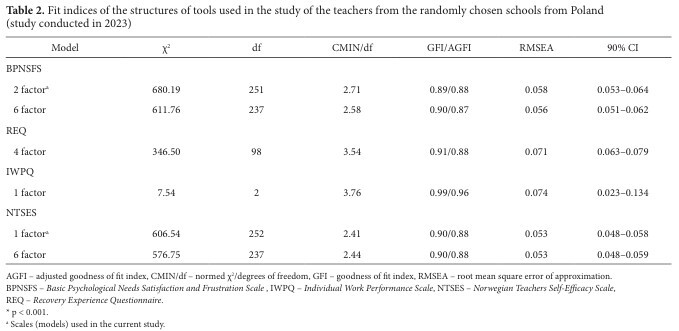Online first
Bieżący numer
Archiwum
Najczęściej cytowane 2024
O czasopiśmie
Zespół Redakcyjny
Komitet Redakcyjny
Polityka prawno-archiwizacyjna
Kup czasopismo
Klauzula informacyjna o przetwarzaniu danych osobowych
Deklaracja dostępności
Instrukcje dla Autorów
Instrukcje dla Recenzentów
Polecamy
Kontakt
Recenzenci
2024
2023
2022
2021
2020
2019
2018
2017
2016
2015
2014
2013
Redakcja i tłumaczenia
PRACA ORYGINALNA
What makes an efficacious teacher? The role of basic psychological needs and recovery from stressors in relation to teachers' self-efficacy and performance
1
The Maria Grzegorzewska University, Warsaw, Poland
(Institute of Psychology)
2
Central Institute for Labour Protection – National Research Institute, Warsaw, Poland
(Laboratory of Work Psychology)
Data publikacji online: 10-05-2024
Autor do korespondencji
Michał Szulawski
The Maria Grzegorzewska University, Institute of Psychology, Szczęśliwicka 40, 02‑353 Warsaw
The Maria Grzegorzewska University, Institute of Psychology, Szczęśliwicka 40, 02‑353 Warsaw
Med Pr Work Health Saf. 2024;75(4):309-20
SŁOWA KLUCZOWE
teachersself-determination theorybasic psychological needsindividual performancerecovery from stressorsteachers self-efficacy
DZIEDZINY
STRESZCZENIE
Background: Studies suggest that teachers’ ability to perform their work tasks well is one of the most important antecedents of the achievements of students. This project was focused on verifying an underresearched relation among basic psychological needs satisfaction and frustration, the way the teachers use their time to recover from work stressors, with their performance and self-efficacy. Material and Methods: The participants were 503 teachers from a representative sample of schools in Poland. In the study performance (Individual Work Performance Questionnaire), self-efficacy (Norwegian Teachers Self-Efficacy Scale), basic psychological needs (Basic Psychological Needs Satisfaction and Frustration Scale), and recovery processes (Recovery Experience Questionnaire) were measured. Results: As expected, the results showed that there is a strong relation between basic psychological needs and teachers’ individual performance and self-efficacy. However, this relation is partially mediated by some recovery processes, mostly control and detachment. Conclusions: The results prove that, to some extent, the relation between basic psychological needs satisfaction and teachers’ performance and self-efficacy could be explained by the stress recovery processes undertaken by teachers in their free time. This study focused on explaining these relations and suggesting ideas for further studies in this domain. Med Pr
Work Health Saf. 2024;75(4):309–320
Udostępnij
ARTYKUŁ POWIĄZANY
Przetwarzamy dane osobowe zbierane podczas odwiedzania serwisu. Realizacja funkcji pozyskiwania informacji o użytkownikach i ich zachowaniu odbywa się poprzez dobrowolnie wprowadzone w formularzach informacje oraz zapisywanie w urządzeniach końcowych plików cookies (tzw. ciasteczka). Dane, w tym pliki cookies, wykorzystywane są w celu realizacji usług, zapewnienia wygodnego korzystania ze strony oraz w celu monitorowania ruchu zgodnie z Polityką prywatności. Dane są także zbierane i przetwarzane przez narzędzie Google Analytics (więcej).
Możesz zmienić ustawienia cookies w swojej przeglądarce. Ograniczenie stosowania plików cookies w konfiguracji przeglądarki może wpłynąć na niektóre funkcjonalności dostępne na stronie.
Możesz zmienić ustawienia cookies w swojej przeglądarce. Ograniczenie stosowania plików cookies w konfiguracji przeglądarki może wpłynąć na niektóre funkcjonalności dostępne na stronie.






